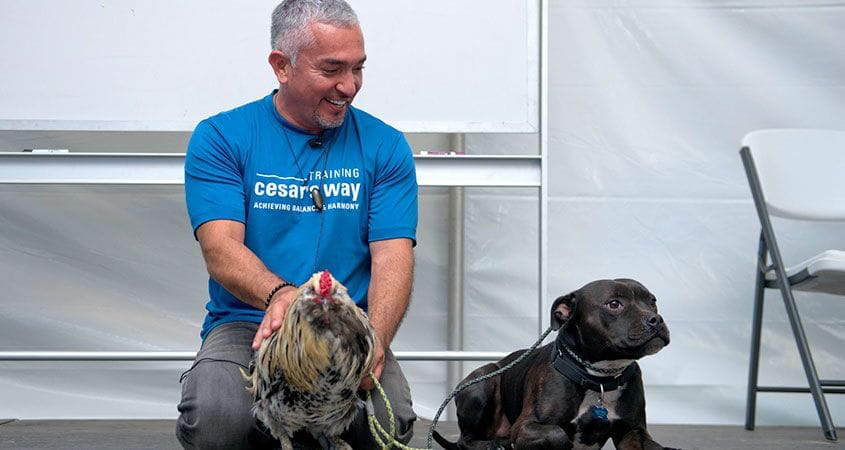The famous behaviorist B.F. Skinner made a discovery in the course of working with birds that’s known as “pigeon superstition” to this day. Basically, he had a group of pigeons in a cage along with an automatic bird feeder.
The feeder would dispense a pigeon treat at regular intervals, and that timing had absolutely nothing to do with the pigeons’ behavior. However, it wasn’t very long before each of the pigeons began showing very specific and different behaviors in order to get food. One of them would circle the cage counterclockwise, for example, while another would stick his head up into a corner of the cage.
Skinner never set out to teach these behaviors to the pigeons. They adapted them on their own in response to a reward, but the learning was accidental. Sound familiar?
I see the same thing constantly with people and their dogs, where the dog will repeat an unwanted or unusual behavior. “How do I make him stop that?” people will ask me. “I never taught him to do that.”
Things to Avoid
Rewarding the Dogs at the Wrong Time
But the thing is this: People do teach these behaviors without even knowing it by accidentally rewarding their dogs at the wrong time. Just like the pigeons, the dog will learn, “If I do thing A, then I get reward B.”
This is called classical conditioning and while it can be easy to create a conditioned response, it can be much harder to make that response completely go away. Conditioning happens when an animal (or person) is either rewarded or punished for an action — but let me discuss those two terms first.
The scientific definition of punishment is different than the everyday definition. When people think of punishment, they usually think of something physical, like spanking a child, or something with costly consequences, like a huge fine or jail time.
Punishment and Reward
In behavioral science, though, “punishment” just means anything that decreases the preceding behavior. For example, say your spouse likes to flip through the channels on the TV but hates country music. If you put on country music when the channel flipping starts and it causes the behavior to diminish, then you’ve just punished your spouse.
Reward is exactly the opposite: anything that increases the preceding behavior in the subject, whether it’s your spouse or your dog.
If you want to think of it in the simplest terms, punishment results in something undesired by the dog. Reward results in something that is desired. And there’s one further variation: both can be either positive or negative. When the action is positive, you add something to the dog’s environment. When it’s negative, you take something away — this makes sense if you think of them as “plus” and “minus.”
So this gives us four possible ways in which to condition a dog’s behavior. Keep in mind that the adding or removing can be done by a person training the dog, or they can be natural consequences of an action, like the dog burning its nose on a hot stove or finding a hamburger in the trash.
- Positive Reinforcement is adding something desired in response to a behavior, such as giving your dog a treat. This is the one action out of the four that most people are familiar with and it’s pretty straightforward: the dog does something and gets something good because of it.
- Positive Punishment means adding something undesired in response to a behavior: a dog sniffs a beehive and gets a stinger in the nose — this adds pain, which is undesired and teaches the dog to not sniff beehives.
- Negative Punishment is removing something desired, such as taking away a dog’s bowl if they show signs of food aggression, which removes the incentive for the aggression — there’s nothing to fight over anymore.
- Negative Reinforcement is removing something undesired, such as pulling that stinger out of the dog’s nose, and this increases the dog’s perception of you as a source of good things. It also makes the bee hive less scary, because you’re there to remove the consequences.
Because a lot of people tend to give their dogs way too much affection, they also tend to give way too much reinforcement, both positive and negative, whether they’re aware of it or not. It’s easy to know when you’re punishing a dog and to refrain from doing it, but a lot harder to tell when you’re giving them reinforcement and teaching them “pigeon superstition.”
But remember: reinforcement increases the preceding behavior. If you comfort a dog that is fearful, that affection is reinforcement. The fearful behavior will increase.
How to Correct Your Dog
I know what you’re wondering. Doesn’t punishing a fearful dog also make it more fearful? The answer to that is no, and this is why we have to remember the scientific definition. You’re not punishing the dog. You’re only adding or subtracting something in order to reduce the undesired behavior.
This is why dog trainers like to use the word “correction,” because it sounds much nicer than “punishment.” But the goal is the same. If your dog jumps on people, pushing her back and making her sit is the same thing whether we call it by one word or the other: It is a technique designed to make the dog jump less and, eventually, not at all.
Whether you want to call it punishment, correction, or something else, just remember that the goal is to reduce an undesired behavior — and remember to also always be aware of when you’re unintentionally rewarding your dog and reinforcing her unwanted actions.
Stay calm, and behave!
Do you train your dog on a regular basis? What tricks can she do?











